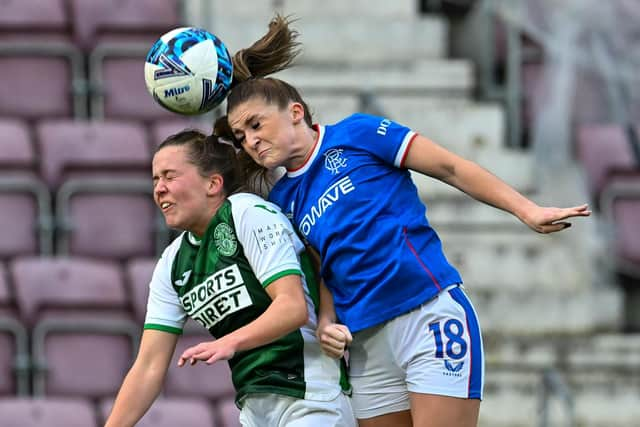New heading guidelines: How it is affecting Hibs, Hearts and Spartans in the SWPL
and live on Freeview channel 276
Footballers in Scotland are now be banned from heading the ball the day before and the day after matches after studies showing how it can affect the brain. Clubs are also being advised to limit heading balls in training to one session a week because of the links between repetitive heading of a football and brain damage.
The guidance by the Scottish Football Association was introduced after a landmark study revealed former professional players were three and a half times more likely to suffer from dementia and other serious neurological diseases.
Advertisement
Hide AdAdvertisement
Hide AdThe managers of Hibs, Hearts and Spartans are all fully supportive and insist the new guidance is not having an impact on training. Indeed, Spartans manager Debbi McCulloch believes the new ruling is long overdue.


“Something had to be done about it,” she told the Edinburgh Evening News. “Concussion in our sport hasn’t been taken as seriously whether that’s through heading or through physical contact and things like that. There’s been a lot of research and we need to take that seriously because the long-lasting affects could be detrimental to someone’s health.
“From our club’s point of view, heading isn’t something we really incorporated into training, unless we are doing set pieces, crossing and finishing. The majority of that wouldn’t be with the head. The rule has not really made us change anything. We respect the research that has been done and the findings that have been recorded. Our player welfare is of paramount importance to us so we will make sure they stay as safe as possible.”
Hibs have struggled when it comes to defending set plays this season. However, Hibs manager Dean Gibson hasn’t found the need to do extra heading drills as a result and agrees with McCulloch.
Advertisement
Hide AdAdvertisement
Hide Ad“You don’t need to train necessarily by just heading the ball,” he stated. “Heading the ball is the last part of the defending. If you are defending a cross, the header is the last part of that. It comes down to your positioning, where you stand in the box to give yourself a chance to go and header the ball. Defending crosses isn’t always heading, it could be volleys or just clearing your lines.
“The most important thing is just organising the line better, communication has to be right, starting position has to be right as well as a willingness to want to go and win the ball. Heading the ball is obviously a big part of it, but if you don’t get those other parts right, you don’t give yourself a chance to go and head the ball.”
Similar heading guidelines are already in place in England and elsewhere, including the United States. Before making her way to Scotland, Hearts manager Eva Olid coached in the US. The new guidelines in Scotland are something the Spaniard is accosomed to.
“The SFA asked us of our opinion on coaching, I gave mine,” she said. “We have to reduce the activity of heading the ball during the week. It’s good to avoid doing it after the game because in the match the players are in a lot of heading situations and it’s not good to be doing it the following day. In the United States they are stricter, so I am used to it.”